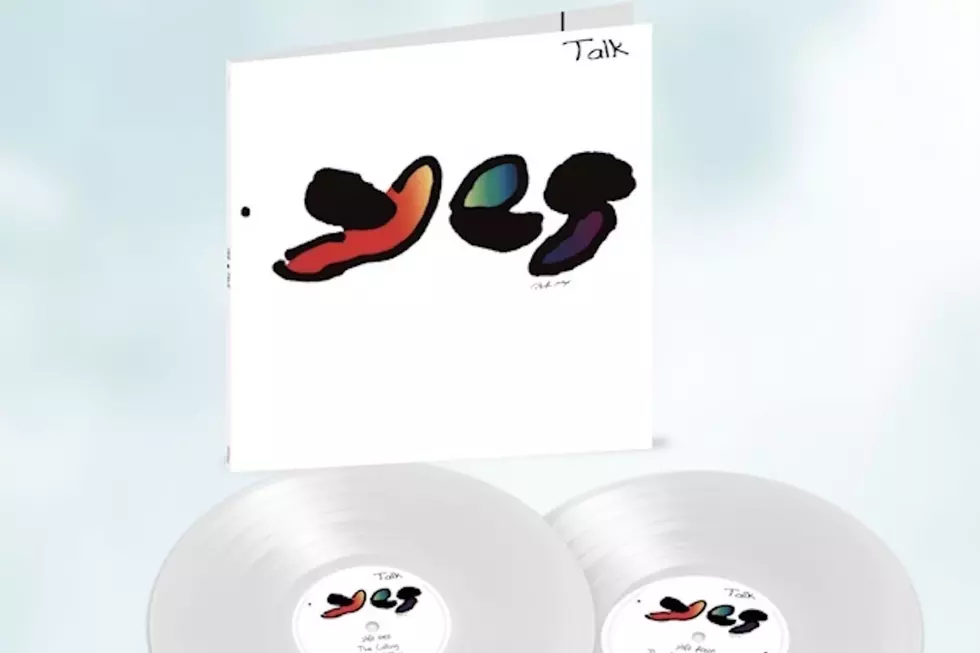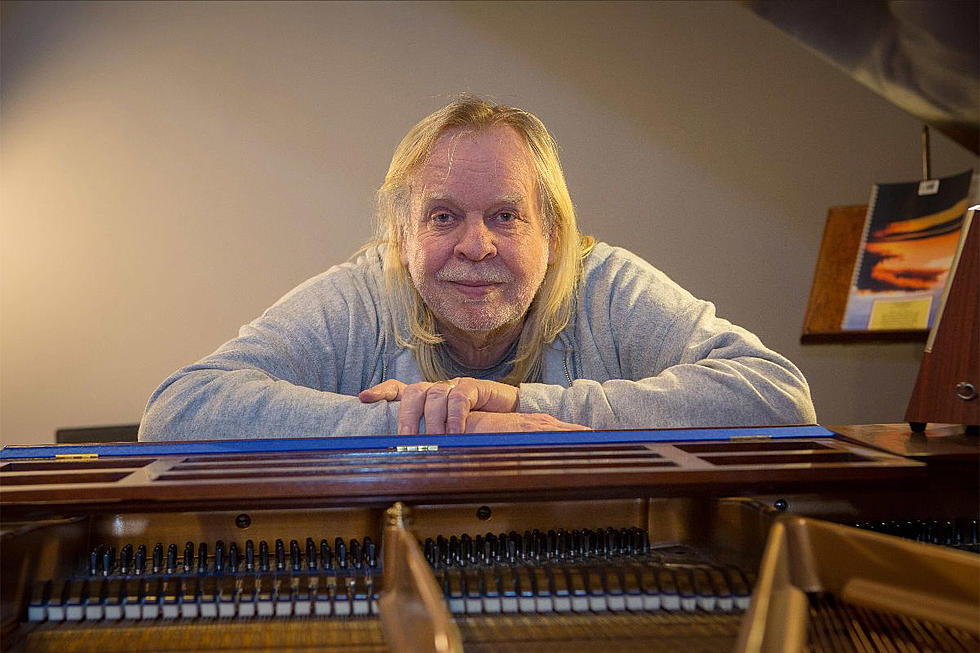
Top 10 Yes Songs of the ’70s
The '70s were a particularly creative period for Yes, as the prog pioneers worked without boundaries or time restrictions. We came up with a list of our favorites from the era, then spoke with the late bassist Chris Squire as he prepared to hit the road for a tour spotlighting three classic Yes albums to get his thoughts. Former vocalist Jon Anderson also discussed a few other songs during a prior conversation. Here is our list of the Top 10 Yes Songs of the '70s.
- 10
'America'
Single (1971)The origins of a cover tune which kicks off our list of the Top 10 Yes Songs of the '70s were fairly organic, as Chris Squire recalled. “Both Jon Anderson and myself were big fans of Simon & Garfunkel, and we liked the song a lot. So, we just took it and decided to 'Yes-isize' it," Squire told us. "Of course, that was also around the time when Steve Howe was still fairly new in the band. He was bringing in his slightly country style of guitar that he uses on that track. That was also at the point where Rick Wakeman had just come into the band and if I recall, the Mellotron on ‘America’ was actually played by Bill Bruford. Rick had just joined and he threw a few overdubs on the end of the sessions and that was that, really. But it turned out to be really good."
- 9
'Heart of the Sunrise'
From: 'Fragile' (1971)Squire said he always had a soft spot for "Heart of the Sunrise," "even though I don’t really have favorites – because I think that everything that we’ve done has value and [there are] little gems of music in pretty much everything we’ve done. But ‘Heart of the Sunrise’ sort of started the trend that would move us towards Close to the Edge in that it had movements within it, as opposed to just being a song in one time signature," Squire said. "It had different fast bits and slow bits and hectic bits and calm bits. It was like a mini-Close to the Edge, I suppose – a precursor to what was to come.”
- 8
'The Gates of Delirium'
From: 'Relayer' (1974)"The Gates of Delirium" began as a piece of music that Jon Anderson wrote on the piano, “very badly” in his words. The collaborative spirit of Yes helped to bring the song to life in its proper form. Anderson notes that “me and Steve Howe were very connected in the early-'70s,” adding that Howe was “an incredible guy to have around with so many chords at his fingertips.” "The Gates of Delirium" came about in the midst of both the Vietnam War and the Cold War, and Anderson said he was trying to “exorcise the demons out of war and the demons out of our consciousness.” Singing “soon, oh soon the light” was Anderson’s way of saying that “we should be collectively reaching for the light in this lifetime.”
- 7
'And You and I'
From: 'Close to the Edge' (1972)At the beginning of "Eclipse," the second movement of "And You and I," Rick Wakeman weaves together swirling passages of Mellotron, with a very Moody Blues-like tint to the feeling of his playing. Combined with a Mini-Moog, he virtually blacks out the sun within your musical mind. Anderson’s cresting vocals then obliterate the remaining senses: “Coming quickly to terms of all expression laid / Emotions revealed as the ocean made / As a movement regained and regarded both the same / All complete in the sight of seeds of life with you.”
- 6
'Time and a Word'
From: 'Time and a Word' (1970)The title track from Yes' second album, which ends the first half of our list of the Top 10 Yes Songs of the '70s, carries an overwhelming amount of positivity in lyrics penned by Anderson and his former Warriors bandmate David Foster: “Have you heard of the word that will stop us going wrong / Well the time is near and the word you’ll hear / When you get things in perspective.” Chris Squire’s signature bass sound began developing on this album, thanks to an unknown quirk with a headphone output that was light on the low end. That caused the producers to accidentally mix the album so that Squire’s bass featured very prominently in the final mixes. What began as a mistake became a trademark element.
- 5
'Starship Trooper'
From: 'The Yes Album' (1971)The Yes Album saw the entry of Steve Howe into the lineup, and Squire said his arrival “upped our level of writing.” "Starship Trooper" closes the first side of the album and plays out in three movements. “Steve brought in the third section ‘Wurm,’ which was something that Steve had written," Squired said. "Combined with the sections that Jon and myself wrote for that song, it made it a really interesting song. The more people you have writing usually the better things are.”
- 4
'Close to the Edge'
From: 'Close to the Edge' (1972)Occupying a full album side, "Close to the Edge" served as the title track for an album that found Yes pushing boundaries to the limit when it came to song length. It remains one of the most epic tracks the band ever put to tape. (Witness the stately organ from Rick Wakeman which elevates the third movement, "I Get Up, I Get Down.") Squire noted that Yes had “become comfortable doing long songs,” and Close to the Edge was rounded out by two additional longer pieces, "And You and I" and "Siberian Khatru." Yes entered the studio having already worked the title song out, performing "Close to the Edge" in full so they could develop a version that would fit within the constraints of one album side on vinyl.
- 3
'Long Distance Runaround'
From: 'Fragile' (1971)"Long Distance Runaround" is a track that Squire was naturally quite fond of, because of his now-famous bass feature "The Fish" which segues out of "Runaround." In concert, "The Fish" became the forum for Squire’s bass solo, the length of which sometimes stretched into double digits. "Long Distance Runaround" itself had untapped '70s-era potential in the view of Squire, who told us he was “surprised that it had never been used for a long-distance phone company as a jingle.” Of course, Squire added, “now that we’re in the cellular age, it’s irrelevant.”
- 2
'I've Seen All Good People'
From: 'The Yes Album' (1971)“I’ve seen all good people / Turn their heads each day / So satisfied I’m on my way.” How many good people? Quite a lot. Decades after Squire co-wrote this track with Anderson, it remained the second most played track of Yes on radio – behind only the 90125-era smash "Owner of a Lonely Heart." "I've Seen All Good People" opens with a capella vocals from the band before moving into the first half, which is titled "Your Move." Hitting the midway point, Yes inserts lyrical strains from John Lennon's "Give Peace a Chance" as they begin to transition into the second half. The track moves at an appropriately lilting pace for the rest of the way.
- 1
'Roundabout'
From: 'Fragile' (1971)One of the most recognizable songs in the Yes catalog, "Roundabout" made an appearance on our list of the Top 100 Classic Rock Songs – so it's a natural to top our list of the Top 10 Yes Songs of the '70s. As Squire noted, the track brought the band a lot of important early attention – and new fans. The genesis of "Roundabout" came about during a concert tour when Yes was driving from Aberdeen to Glasgow. Jon Anderson told us he thought of the title, because he and Steve Howe were “messing around with an idea of a song” while en route and they crossed “so many roundabouts” during the trip. Looking up, Anderson saw that the mountains surrounding them seemed to be coming out of the sky, an event which completed the early birth of a timeless concert favorite.
More From Ultimate Classic Rock









